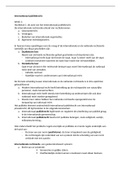Tentamen (uitwerkingen)
SJD1501 Assignment 3 Semester 2 2024 | Due 12 September 2024
- Vak
- Instelling
- Boek
SJD1501 Assignment 3 Semester 2 2024 | Due 12 September 2024. All questions answered with references. Assessment 3 - 568042 568042 ASSESSMENT 3 - WRITTEN ASSIGNMENT 1. What are the differences between criminal and civil cases in the Republic of South Africa? (2 marks) 2. Dis...
[Meer zien]














